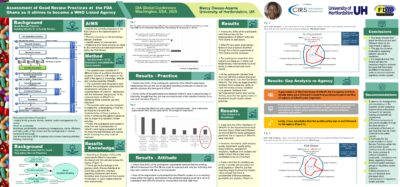Objectives
Methods
Results
Conclusion
- Formalise the full implementation of Good Review Practices within the agency which would continue to build quality into the review process to achieve a consistent, predictable, transparent and timely regulatory review.
- Involve patient advocacy groups in regulatory review activities.
- Make provisions to include feedback from pharmaceutical manufacturers in regulatory review activities.
- Improve the transparency and consistency of the scientific review system by implementing a structured framework for decision making and benefit-risk assessment.
- Enhance transparency and communication through the development of summaries of the basis of approval that may be made available in the public domain.
This poster by Mercy Owusu-Asante was presented at the 2025 DIA Global Annual Meeting, 16-20 June 2025, Washington DC, USA.

